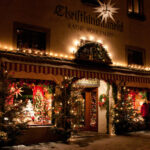Germany, situated in the heart of Europe, is a country renowned for its rich history, breathtaking landscapes, and vibrant culture. From medieval castles to bustling metropolises, Germany offers a tapestry of experiences that captivate both locals and visitors alike. In this article, we will delve into some fascinating facts about Germany, shedding light on its diverse heritage, iconic landmarks, and cultural treasures. Embark on a virtual journey as we explore the many facets that make Germany a truly unique and enchanting destination.
- Germany’s Historical Significance: Germany boasts a storied history, with its origins dating back to the Holy Roman Empire. It has been home to influential figures such as Martin Luther, Johann Sebastian Bach, and Albert Einstein. Explore Germany’s deep-rooted historical significance and the profound impact it has had on the world.
- Rich Cultural Heritage: German culture is a captivating blend of traditions, art, and literature. From the iconic works of Johann Wolfgang von Goethe to the enchanting symphonies of Ludwig van Beethoven, German contributions to the arts are unparalleled. Discover the country’s love for beer, its world-famous Oktoberfest celebrations, and the vibrant folk festivals that bring communities together.
- Architectural Marvels: Germany boasts a mesmerizing array of architectural wonders. From the fairytale-like Neuschwanstein Castle to the historic Cologne Cathedral, the country is a treasure trove of breathtaking structures. Uncover the architectural brilliance of Germany’s iconic landmarks and marvel at their splendor.
- Natural Beauty: Nature enthusiasts will find solace in Germany’s awe-inspiring landscapes. The Black Forest, the Bavarian Alps, and the romantic Rhine Valley offer breathtaking vistas and endless opportunities for outdoor activities. Delve into Germany’s diverse natural beauty and explore its numerous national parks and scenic routes.
- Technological Innovations: Germany has long been recognized as a hub for technological advancements. From the invention of the automobile by Karl Benz to the development of advanced machinery and engineering, Germany’s contributions to science and technology have been groundbreaking. Uncover the country’s innovative spirit and its impact on various industries.
- Culinary Delights: German cuisine is a delight for food enthusiasts. From hearty sausages and sauerkraut to mouthwatering pretzels and Black Forest cake, Germany offers a rich tapestry of flavors. Discover the country’s regional specialties and indulge in its culinary treasures.
- Education and Academic Excellence: Germany is renowned for its exceptional education system and world-class universities. It attracts students from around the globe, offering a wide range of academic programs and research opportunities. Learn more about Germany’s commitment to education and its contribution to the world of academia.
- Environmental Sustainability: Germany has made significant strides in promoting sustainability and renewable energy. The country’s commitment to green technologies and initiatives has positioned it as a global leader in environmental conservation. Explore Germany’s efforts towards sustainability and its ambitious goals for a greener future.
Germany’s allure lies in its fascinating history, diverse culture, and awe-inspiring landscapes. From iconic landmarks to technological innovations, this country has much to offer. Whether you’re captivated by its rich heritage or enchanted by its natural beauty, Germany is a destination that leaves an indelible impression on all who visit. Embark on your own adventure and experience the wonders of this enchanting land firsthand.
Geography (lands, topography and climate)
Climate In Germany
- Population,
- Age-Gender Distribution,
- Religion,
- Urbanization,
- Social structure,
- German Nationality Law
- Immigration,
- Foreigners in Germany,
- Ethnic Germans,
- Asylum-Seekers In Germany,
- Women In German Society,
- Marriage and Family in Germany,
- Fertility in Germany,
- Mortality in Germany,
- Healthcare system
- Elementary education,
- Secondary education in Germany,
- Vocational education and training,
- Higher education
- Domestic Economy of Germany,
- German International Economic Relations,
- the Economic Miracle,
- Impact of Unification on German Economy,
- Germany in the World Economy,
- Deutsche Mark,
- Bundesbank,
- Business culture
Government and Politics in Germany:
- the Chancellor,
- the President,
- the Legislature in German Politics,
- Federalism in Germany
- The German Constitution
- German flag,
- Bundestag,
- Bundesrat of Germany,
- Electoral System of Germany,
- German Political Parties,
- Extra Party Political Forces in Germany
German Armed Forces:
- National Security in Germany,
- Prussia’s Emergence as a Military Power,
- Creation of the Bundeswehr,
- The German Military in Two World Wars,
- Bundesheer,
- Bundesmarine,
- Luftwaffe,
- Military Justice in Germany,
- German Uniforms, Ranks, and Insignia,
- Foreign Military Relations,
- Internal Security,
- Land Police Agencies,
- Dissidence and Terrorist Activity,
- Federal Police Agencies,
- Police Agencies in Germany
The information is provided by the Library of Congress. This study attempts to review Germany and treat its dominant social, political, economic, and military aspects in a concise and objective manner.
The name Germany is used in three senses: first, it refers to the region in Central Europe commonly regarded as constituting Germany, even when there was no central German state, as was the case for most of Germany’s history; second, it refers to the unified German state established in 1871 and existing until 1945; and third, since October 3, 1990, it refers to the united Germany, formed by the accession on this date of the German Democratic Republic (GDR, or East Germany) to the Federal Republic of Germany (FRG, or West Germany). The name Federal Republic of Germany refers to West Germany from its founding on May 23, 1949, until German unification on October 3, 1990. After this date, it refers to united Germany. For the sake of brevity and variety, the Federal Republic of Germany is often called simply the Federal Republic.
The Federal Republic of Germany consists of sixteen states (Laender; sing., Land ). Five of these Laender date from July 1990, when the territory of the German Democratic Republic was once again divided into Laender. For this reason, when discussing events since unification, Germans frequently refer to the territory of the former East Germany as the new or eastern Laender and call that of the former West Germany the old or western Laender. For the sake of convenience and variety, the text often follows this convention to distinguish eastern from western Germany.
Spellings of place-names used here are in most cases those approved by the United States Board on Geographic Names. Exceptions are the use of the conventional English names for a few important cities, rivers, and geographic regions.
Measurements are given in the metric system. A conversion table is provided to assist readers unfamiliar with metric measurements.







